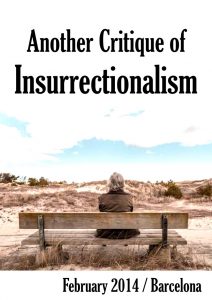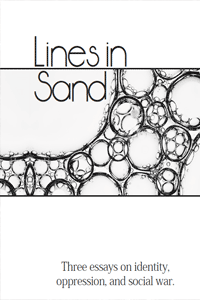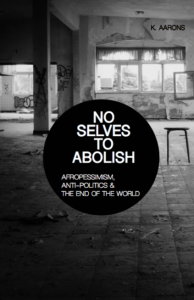A Wager on the Future: Anarchist organization, the Islamic State, the Crisis, and Outer Space

“To have any possibility of destroying this prison society and averting the horrible destiny that is unfolding around us, it is indispensable: to stop conceiving of our weakness in terms of dissemination; to abandon the practice of recruitment and the delirium of mass organization that it represents; and to energetically criticize those currents that make use of marketing and populism. But much more than attacking our errors, we have to mark out other paths to follow, with actions more than with words.
To start with, it cannot be a single path. No one practice is capable of including all the activities necessary for a revolution. We must think of revolt as an ecosystem. If we try to be the only species, we kill the revolution.”
Another Critique of Insurrectionalism

This text is less so a general critique of insurrectionalist methodology or ideas than a critique of how a specific insurrectionalism, that which has developed in Barcelona in the last eighteen years, has played out in practice. It problematizes a set of practices and attitudes that it sees in the self-proclaimed insurrectionalist milieu there, from arrogance to bad security to an incomplete understanding of repression. At times it broadens to critique insurrectionalisms of other places or more general aspects of the tendency.
Against Innocence: Race, Gender, and the Politics of Safety
 First published 2012 in LIES: A Journal of Materialist Feminism Vol. 1
First published 2012 in LIES: A Journal of Materialist Feminism Vol. 1
“Ultimately, our appeals to innocence demarcate who is killable and rapable, even if we are trying to strategically use such appeals to protest violence committed against one of our comrades. […] When we rely on appeals to innocence, we foreclose a form of resistance that is outside the limits of law, and instead ally ourselves with the State.”
Contre l’oppression des adultes sur les enfants
“L’enfant est la propriété de l’adulte” remarque Catherine Baker, qui a bien du mal à se satisfaire de ce constat… S’attaquant à la notion d’enfance, qui permet de justifier les rapports sociaux de domination des adultes sur les enfants, l’auteure se livre à un plaidoyer pour la désobéissance.Extrait du livre Insoumission à l’école obligatoire, ce texte en constitue le chapitre 5 (dans ce livre, Catherine Baker s’adresse à sa fille de quatorze ans, qu’elle n’a pas mise à l’école).
La brochure téléchargeable en PDF propose à la suite du texte de Catherine Baker, “L’âge de raison”, un court texte de David Olivier, publié en 1986 dans la revue Information, Réflexion libertaire.
Lines in Sand

With the sub-title “Three essays on identity, oppression, and social war,” Lines in Sand is a collection by Peter Gelderloos that looks critically at identity politics and anti-oppression politics. All of them are very thought provoking and well worth reading. These aren’t knee-jerk criticisms, but rather are thoughtful explorations of the problematic aspects of identity and anti-oppression politics and practice.
Même pas sage, même pas mal

« On les appelle enfants. Quand enfant devient trop ridicule, on parle des adolescents. La loi dit les mineurs. Des mots pour créer une séparation en fonction de l’âge. Des mots qui masquent et justifient l’oppression. »
À l’heure où la dernière loi sur la prévention de la délinquance mijote au parlement, la jeunesse est de plus en plus prise en étau. Elle est encadrée par des dispositifs sécuritaires, publicitaires, culturels, toujours plus visibles, qui viennent compléter / renforcer les vieux modes de contrôle comme le travail, la famille, l’école – ou s’y substituer parfois. Ces dispositifs sont portés par un même mouvement qui, tout en utilisant la jeunesse comme emblème idéal de la marchandise, présente une partie d’entre elle comme bouc émissaire. Ils servent à faire intégrer dès le berceau ce que la grande majorité a déjà accepté et, parallèlement, à former des citoyens finis infoutus de se révolter. Les mouvements récents, des lycéens contre la loi Fillon, des émeutiers de novembre 2005 et celui contre le CPE et son monde, ont montré que les pouvoirs ne sont pas arrivés à leurs fins. Les textes rassemblés ici, certains anciens, d’autres récents, tous d’actualité, aimeraient mettre un peu d’air dans une atmosphère empuantie par la propagande.
No Selves To Abolish

This text attempts to show that afropessimist theory is not simply at odds with, but in fact hostile to identity and privilege politics, whether Black or non-Black. Having extracted the afropessimist position from the politics of symbolic valorization or integration, the author argues that its deeper affinity is with those tendencies of anarchist, communist, and queer thought in which revolutionary practice tends to be understood as the immediate self-abolition of the existing conditions that produce our identities. It concludes with a series of preliminary practical proposals placing what has so far gone by the name “solidarity” on a different footing.
Reflections on the Ferguson Uprising
In February 2015, after months of confrontations in response to the murder of Michael Brown, a number of anarchists from the St. Louis area gathered to reflect on their experiences in the streets, their role in predominantly black struggles, and the ramifications of arson and gunfire in protests. Crimethinc sent some discussion questions to get the ball rolling, but mostly they let the conversation take its own course, speaking with admirable frankness and vulnerability. The result is an important historical document, of interest to anyone who might one day participate in something similar. This transcript originally appeared in the 12th issue of Rolling Thunder, which examines the movement that spread across the United States from Ferguson in great detail.
Self as Other: Reflections on Self-care
 In activist circles and elsewhere, it has become commonplace to speak of self-care, taking for granted that the meaning of this expression is self-evident. But “self” and “care” are not static or monolithic; nor is “health.” How has this discourse been colonized by capitalist values? How could we expand our notion of care to encompass a transformative practice?
In activist circles and elsewhere, it has become commonplace to speak of self-care, taking for granted that the meaning of this expression is self-evident. But “self” and “care” are not static or monolithic; nor is “health.” How has this discourse been colonized by capitalist values? How could we expand our notion of care to encompass a transformative practice?
Following “For All We Care,” analyzing the contradictory currents within the category of care, Crimethinc presents “Self as Other,” combining that text with three more essays in which individuals recount their personal struggles with the concept and practice of care.
Terror Incognita

Terror Incognita challenges conventional notions about consent, violence, sexuality, desire, and freedom, in hopes of pushing the discourse about these subjects far out of familiar territory.
We are all very anxious
What could actually counter anxiety? Do we have to beat security guards, insurance policies, religious communities, and antidepressants at their own game, somehow making people feel safe in a hostile and hazardous world? Trying to allay anxiety as a separate project from abolishing the conditions that create it is surely doomed. Should we accept the worst-case scenario as a foregone conclusion and hurry forth to meet it, transforming our anxiety into a weapon? If anxiety is the omnipresent guardian of the prevailing order, it presents the perfect point of departure for resistance—but this does not answer how those already immobilized by it could perform such alchemy. Perhaps, in the course of taking on the ruling order, we could create something together that inspires confidence, grounding ourselves in a shared sense of reality that no market or military could take from us.
Towards an anarchist ecology
In May 2013, Knowing The Land Is Resistance started a series of articles called Towards an Anarchist Ecology. This series was based on a workshop of the same name they had been giving in South-western Ontario that set out to offer a precise critique of mainstream ecology and to offer some starting points for developing an anarchist knowing of the land. The last of the eight essays was released in mid-January 2014, and they are now all collected together into a zine!
Vortext
Therein, you may read about the hijinks and provocations of the Experimentation Committee; about the uses of black magic and self-destruction in the service of insurrection; about passionism, consonance, and terrible freedom; a philosophical inquiry into the relation between anarchy and friendship; and a great deal more.
Ethical Prude
“Not the opposite of sex-positive feminism, and not the woman-policing of the right. A feminism which articulates a radical critique of sex and which dares to consider the proposal that sex may not, inherently, be nice.”
Deleuze sur Spinoza / Deleuze on Spinoza
Knowing what you are capable of. This is not at all a moral question, but above all a physical question, as a question to the body and to the soul. A body has something fundamentally hidden: we could speak of the human species, the human genera, but this won’t tell us what is capable of affecting our body, what is capable of destroying it. The only question is the power of being affected
Oceanic Feeling
“Oceanic feeling is not an infantile defense or regressive return to a pre-Oedipal state, but part of a mature process of becoming; an experience of ego loss that enables one to commune with “substance” of existance in a way that radically alters ones orientation toward the world.”
Accounting for ourselves
À propos d’autonomie, d’amitié sexuelle et d’hétérosexualité
Sommaire :
– Les choix de vie relationnels, une histoire de goût ?
– Autonomie et rapport à l’autre
– Présentation du cadre de la non-monogamie responsable
– L’amour exclusif
– Le paradigme de l’amitié
– La réunion de l’amitié et du désir
– Amour et hétérosexualité – Point de vue féministe
– Pascale Noizet et la fonction de l’amour dans l’hétérosexualité
– Pour une pratique hétérosexuelle féministe
Imprimer (Attention c’est du A4!!!!)